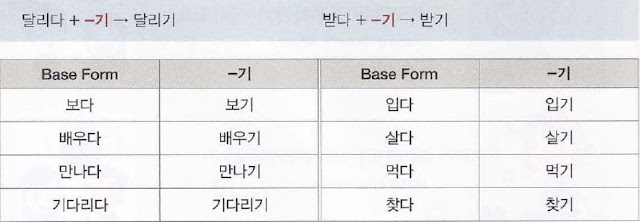 한국말을 공부하기가 어려워요.
한국말을 공부하기가 어려워요.
Studying Korean is difficult.
제 취미는 요리하기예요.
My hobby is cooking.
다리가 아파서 걷기가 힘들어요.
My legs hurt, so walking is hard.
Grammar Focus:
-기 functions to turn verbs and adjectives into nouns and corresponds roughly to ‘-ing’ in English. In a sentence, this form can be used to represent various parts of speech, including subjects and objects. The noun form is made by adding -기 to the stems of verbs and adjectives.
 Examples of entire phrases used as nouns.
Examples of entire phrases used as nouns.
• 집이 멀어서 학교에 오기가 힘들어요.My house is far away, so coming to school is difficult.
• 한국 노래 듣기를 좋아해요. I like listening to Korean songs.
• 혼자 밥 먹기를 싫어해요. I don’t like eating meals by myself.
 Conversation:
Conversation:
A: 한국어 공부할 때 뭐가 제일 어려워요?
What’s the most difficult part of studying Korean?
B: 말하기가 제일 어려워요. Speaking is most difficult.
A: 왜 이 옷을 안 사요? Why won’t you buy this outfit?
B: 그 옷은 입기가 불편해요. 그래서 안사요.
Wearing it is uncomfortable. So I’m not going to buy it.
A: 우리 버스를 탈까요? Shall we take the bus?
B: 아니요, 여기는 버스 타기가 불편해요. 지하철을 탑시다.
No, taking the bus from here is inconvenient. Let’s take the subway.
-기 can be combined with a number of particles to form subjects, objects, and adverbials in a sentence
• -기(를) 좋아하다/싫어하다
• -기(를) 바라다/원하다
• -기(를) 시작하다/끝내다/그만두다
• -기가 쉽다/어렵다/좋다/싫다/나쁘다/재미있다/편하다/불편하다/힘들다
• – 기(에)좋다/나쁘다
• 한국말을 잘하면 한국에서 살기가 편해요.
If you can speak Korean well, then living in Korea is easy.
• 댄 씨, 대학에 꼭 합격하기를 바라요.
Dane, I wish you a successful admission into university.
• 이 책은 글씨가 커서 보기에 좋아요.
The printed text of this book is large, which makes reading it easy.
